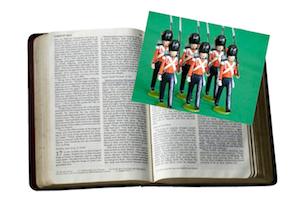 The Conquest of the Promised Land is, for many people, a troubling time in Israel’s history. I’ve talked before about God’s ordering the destruction of the peoples of Canaan; I won’t spend time on it now. What I want to focus on is the role of God in the Conquest.
The Conquest of the Promised Land is, for many people, a troubling time in Israel’s history. I’ve talked before about God’s ordering the destruction of the peoples of Canaan; I won’t spend time on it now. What I want to focus on is the role of God in the Conquest.
He had promised the Israelites that He would drive out the peoples of this land, little by little. He told them that the battles would not depend on the strength of Israel’s army, but on the strength of Israel’s God.
So, what happened? Why were the Israelites unable to complete the Conquest? The Bible points to their unfaithfulness, beginning with the foolishness of the treaty with the Gibeonites. Later passages suggest that they failed to destroy the idols of the nations of Canaan, and that this failure was the biggest contributor to their failings.
In the end, we need to see that the Conquest was the fulfillment of a promise made to Abraham and repeated to his descendants. These battles were fought to secure the land of their inheritance. God was also using them to punish the people of Canaan. Israel was, in this specific instance, the tool of God for punishing the nations, just as were Assyria, Babylon, etc. in later times. This case is unique in that God used His people for this task, but I think that had to do with the Promise.
To some degree, many of the battles fought by Saul and David would have to be included in the Conquest, for they were securing land which had been promised to the Israelites. By my calculations, the Conquest ended with David’s wars, but I’m open to correction on that.

Tim,
What’s your take on all this celebration over Bin Laden’s death?
–guy
Guy,
I’m uncomfortable with much I’ve heard. Especially from the Christian community. Admittedly, I’m especially troubled by the worship of military and adoration of country. And when Obama said, “we are once again reminded that America can do whatever we set our mind to,” my mind went to Genesis 11:6.
I’ve been pondering to what extent we can know what “justice” is. I was in Argentina in September, 2001, and actually heard some young people express the thought that justice had been done: “Those Yankees deserved it.”
I’m also trying to discern the fine line between our desire for justice and our desire for vengeance.
Much to mull over.
Grace and peace,
Tim Archer
Tim,
i listened to several news reports over my morning tea, and i felt largely confused about how to sort out my thoughts, but i was very clear that it all left a very unpleasant and unsettled moral feeling in me.
Here’s something off the top of my head though: Is there a significant difference between the positive spin of Bin Laden’s death in the media this morning and the imprecatory psalms? (Perhaps you mean to get to this in your series.)
–guy
1Sa 18:6 And it came to pass as they came, when David was returned from the slaughter of the Philistine, that the women came out of all cities of Israel, singing and dancing, to meet king Saul, with tabrets, with joy, and with instruments of musick.
1Sa 18:7 And the women answered [one another] as they played, and said, Saul hath slain his thousands, and David his ten thousands.
Something occurred to me this morning: Should we rejoice over Judas’ death? (Wondering if there are any analogous features between the two, and if so, whether Judas’ death and our reaction to it sheds light on Bin Laden.)
–guy
Guy,
I might see the death of Herod in Acts 12 as a closer parallel. Judas was an apostle who fell; that brings about mixed feelings of a different sort.
Grace and peace,
Tim Archer
Tim,
Maybe you’re right. Interestingly, we don’t get to read anything about the early church’s reaction to Herod’s death in Acts.
–guy
Pingback: THE CHRISTIAN AND PACIFISM « Committed To Truth